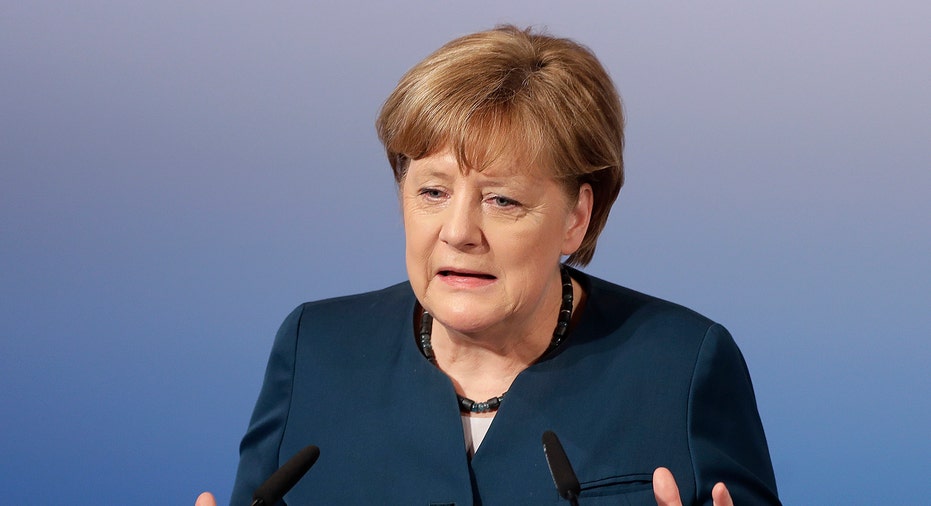German Chancellor Angela Merkel to Testify on Volkswagen Emissions Scandal

BERLIN -- German Chancellor Angela Merkel, a staunch defender of the country's car industry, testifies this week before a parliamentary investigation into Volkswagen AG's diesel cheating that is looking into any relationship between her lobbying and the scandal.
Lawmakers will focus on Ms. Merkel's close relationship with former Volkswagen Chief Executive Martin Winterkorn and a meeting she held in April 2010 with Arnold Schwarzenegger, then governor of California, and Mary Nichols, head of the state's environmental agency, the California Air Resources Board, or CARB, when Ms. Merkel attacked California's limits on diesel emissions.
Germany's parliament formed the committee in July to determine whether Ms. Merkel and her government knew of problems with Volkswagen diesel engines years before U.S. regulators in September 2015 disclosed it had rigged engines to cheat on tough U.S. emissions tests.
The government denies it had any information.
Ms. Merkel is scheduled to testify Wednesday as the committee's final witness. Ms. Nichols is scheduled to testify by video Monday.
Since the diesel scandal was disclosed by CARB and the Environmental Protection Agency, Volkswagen has admitted to installing cheating software on nearly 11 million diesel vehicles world-wide.
The company pleaded guilty to fraud in the U.S. and agreed to pay nearly $25 billion in fines, penalties and compensation. One Volkswagen employee has pleaded guilty to federal conspiracy charges. Another is being held without bond pending trial. Several current and former VW employees still in Germany have been charged in the U.S. with conspiracy.
In April 2010, Gov. Schwarzenegger met Ms. Merkel personally at Los Angeles International Airport and drove her to a working breakfast, publicly praising her economic policies. Ms. Nichols joined the closed-door meeting.
Ms. Nichols said in 2015 that Ms. Merkel complained to her that CARB was "damaging German auto manufacturers with its very strict nitrogen oxide limits."
Ms. Merkel's spokesman declined to comment on the California meeting.
Ms. Nichols said in 2015 that Ms. Merkel told her CARB's proposed targets were unrealistic, the German manufacturers "could not achieve the targets for diesel vehicles in the current draft" and that the proposed targets "would effectively lead to shutting (the German manufacturers) out of the market."
Ms. Nichols said she was stunned by the vehemence of Ms. Merkel's attack.
"It was very surprising for me that the chancellor even knew anything about the German manufacturers' specific nitrogen oxide problems," Ms. Nichols said. "I never experienced a similar intervention by a politician against our environmental laws either before or after."
German lawmakers also hope to question Ms. Merkel about a meeting in Sept. 2015 with VW's then-CEO Winterkorn at the Frankfurt Motor Show, days before the diesel scandal became public.
Mr. Winterkorn told the committee in January that he spoke to Ms. Merkel on the telephone shortly before he announced his resignation on Sept. 23, 2015.
Neither the chancellor nor Mr. Winterkorn has disclosed details about these conversations, which could provide evidence for the committee to determine how much the government knew about VW's emissions cheating before U.S. authorities disclosed the issue on Sept. 18, 2015.
Ms. Merkel has frequently gone to bat for the German auto industry. In 2008 she thwarted European Union efforts to weaken the state of Lower Saxony's 20% blocking minority stake in Volkswagen.
"We will keep fighting," she told thousands of Volkswagen workers at the time.
In 2013, she overturned a European compromise that would have created tougher limits on carbon dioxide emissions in new cars, enlisting help from then-Prime Minister David Cameron. Ms. Merkel's move, widely reported at the time, helped German car makers but put some British car makers at a disadvantage.
Norman Baker, who was British transport minister at the time, discuss details of the 2013 deal with reporters after the VW diesel scandal broke in 2015. He said Ms. Merkel "rang up and wanted a favor" and Mr. Cameron obliged.
The German government declined to comment.
When Ms. Merkel visits Washington to meet with President Donald Trump later this month, the German auto industry wants her to press the U.S. to refrain from any moves to restrict free trade in automotive products.
Mr. Trump has threatened to renegotiate the North American Free Trade Agreement with Mexico and Canada and to impose border taxes on imports that could impact German auto factories in Mexico that export to the U.S.
"We expect Brussels and Berlin to do everything possible to defend free trade," said Matthias Wissmann, a former politician and Merkel ally who is now head of the Association of German Auto Manufacturers. "The big question is whether they will succeed in fine-tuning Nafta."
Last month, Ms. Merkel called Chinese Prime Minister Li Keqiang to lobby against new environmental rules that Germany fears could harm its auto manufacturers by requiring more electric vehicles on the road.
"For us it's important that such rules are free of any discrimination, that they are fair and apply to all companies, Chinese or foreign," Ms. Merkel's spokesman said.



















